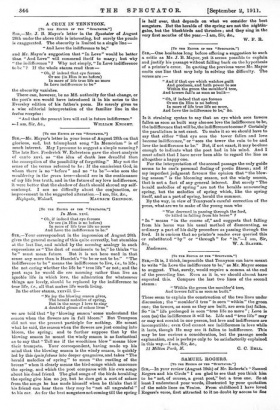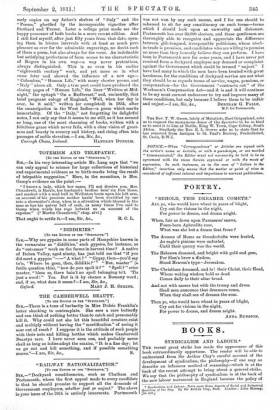SAMUEL ROGERS.
[To THE EDITOR OP THE "SPECTATOR."] SIR,—In your review (August 19th) of Mr. Roberts's "Samuel Rogers and his Circle" I am glad to see that you think him to be " not, of course, a great poet," but a true one. So at least I understand your words, illustrated by your quotation of the noble lines on Venice. From childhood I have loved Rogers's verse, first attracted to it no doubt by access to fine
early copies on my father's shelves of " Italy" and the "Poems," glorified by the incomparable vignettes after Stothard and Turner. Later a college prize made me the happy possessor of both books in a more recent edition. And I still find myself, after just fifty years from that date, open- ing them in leisure intervals with at least as much pure pleasure as ever for the admirable engravings, no doubt each of them a poem, but also always for the verse. An indefinable but satisfying perfectness of form seems to me characteristic of Rogers in his own way—a way never pretentious, always distinguished. This is so even in his earlier "eighteenth century" work, and yet more so in what came later and showed the influence of a new age- " Columbus," "Human Life," with many shorter poems, and "Italy " above all. Only a true poet could have produced the closing pages of "Human Life," the lines "Written at Mid- night," the epitaph " On a Redbreast," and, eminently, that brief pregnant eulogy of England, " Well, when her day is over, be it said," written (or completed) in 1834, after the emancipation in the West Indies—a poem which merits immortality. Of the "Italy," not forgetting its delightful notes, I can only say that it seems to me still, as it has seemed so long, one of the most charming of books, written with a felicitous grace which never fails, with a clear vision of great- ness and beauty in scenery and history, and rising often into passages of noble elevation.—I am, Sir, &c.,







































 Previous page
Previous page